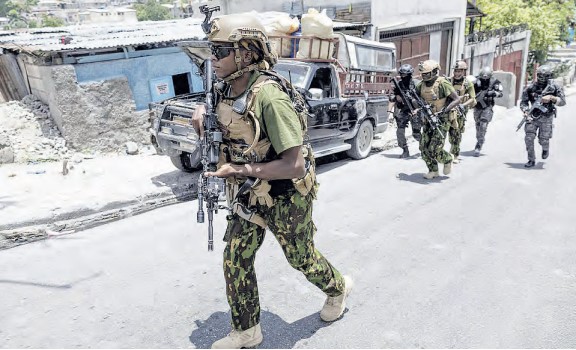
 Kenyan police officers patrol the streets of Port au Princce in Haiti /NPS
Kenyan police officers patrol the streets of Port au Princce in Haiti /NPS
Security forces from Guatemala and El Salvador arrived in Haiti on Friday and Saturday to reinforce a long-delayed United Nations-backed mission.
The mission led by Kenya, is tasked with restoring security and stamping out armed gangs terrorising the country.
A first group of 75 military police arrived on Friday and another 75 on Saturday, according to Guatemala’s government.
The others were eight Salvadorans.
A state of emergency has been in place across the Caribbean nation for months as the government battles gangs that have taken control of much of the capital Port-au-Prince.
The president of Haiti’s transitional presidential council, Leslie Voltaire, alongside Prime Minister Alix Didier Fils-Aime and US Ambassador Dennis Hankins, welcomed the troops at the capital’s airport, Haiti’s interim government said on social media.
“They have come to reinforce the Multinational Force in the fight against gangsters and guns in the country,” the government said.
Guatemalan President Bernardo Arevalo in September had pledged to send 150 military police, three months after initially pledging in a letter to the UN an unspecified contingent and personal equipment.
El Salvador had in August promised 78 soldiers for medical evacuation operations as well as three helicopters, much needed by Haitian security forces contending with mountainous terrain and highways scattered with gang-controlled checkpoints.
Salvadoran President Nayib Bukele, has garnered broad popularity over a crackdown on organised crime in his home country, including the use of mass trials and construction of a mega-jail.
He has stated that he would be able to “fix” Haiti and that its gangs must be “obliterated”.
The mission is being led by Kenya, which deployed nearly 400 police mid last year, far short of the 1,000 it had promised.
The police were later joined by 24 Jamaican personnel and two senior officers from Belize.
The forces are in Haiti to boost a United Nations-backed security mission that has failed to prevent violence from escalating.
They are the first group of a UN-approved international force that will be made up of 2,500 officers from various countries.
In March 2024, armed gangs stormed Haiti’s two biggest prisons, freeing around 3,700 inmates.
The Ouest Department, a region including Port-au-Prince, was put under a state of emergency on March 3, after escalating violence gripped the capital.
Chronic instability, dictatorships and natural disasters in recent decades have left Haiti the poorest nation in the Americas.
In 2021, President Jovenel
Moïse was assassinated by unidentified gunmen in Port-auPrince.
Since then the country has
been wracked by economic chaos
and violent gang warfare.












